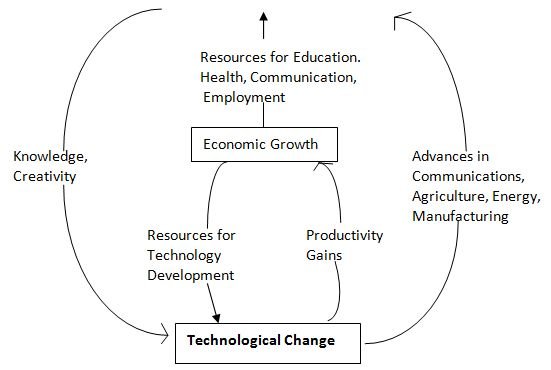Impact of Technological Environment
Technology is one of the most dynamic forces that have been shaping the destiny of mankind all over the world and in all walks of human life. The economic, social and other implication of technology are stated below:
- Higher productivity: Technology has resulted in increased productivity both in terms of quantity and quality. Improvements in productivity lead to reduction in the costs and prices of products and services. Real wages of employees also tend to increase due to gains in productivity.
- Global Competitiveness: Technological progress helps to improve the competitiveness of business firms due to reduction in costs and improvement in quality level. For example, e-business expands customer base and helps to reduce marketing costs. Research and development has become, therefore, an important means of gaining market share in global competition.
- Changing Job Profile: Jobs tend to be upgraded or become more intellectual with advancements in technology. For example, with computerization of banks and post offices a clerical job can no longer be handled by an unskilled employee. A computer literate and competent employee is required. Introduction of new technology requires retraining of employees and rehabilitation of untrainable and displaced peopled. Technological progress makes jobs more challenging and rewarding. Technology influences work flow which in turn determines what individuals in work groups feel and think about one another and about their work situation.
- Need for Multiskilling and Multitasking: Modern business requires managers who posses multiple skills and can perform multiple tasks.For example, an engineering degree alone is not sufficient for a works manager and he needs to possess in addition a degree in management. Technological progress has led to more complex and more demanding business. That is why corporate now prefer people for managerial jobs who have expertise in both technology and management.
- Difficulty in Motivation: Due to increasing percentage of knowledge workers. Financial incentives are no longer enough for motivating the staff to work hard. Technocrats need jobs which provide job satisfaction and opportunities for growth employees. Job hopping has increased and quick promotions and participatory decision-making are required.
- Increasing Need for Capital. Modern technology requires huge amount of funds for invention, innovation and training. Business firms have to exploit all possible sources to raise the needed funds. Rational allocation and utilisation of funds is also necessary. Qualified and honest managers are required to ensure efficient and honest management of financial affairs of business organisation.
- Increasing Obsolescence: New technology creates new products and business. But it also destroys existing products and business. Life cycles of products have become shorter requiring regular creation and development of new products. Existing equipment and technical skills also become obsolete on account of changes in technology. Modernisation or technological up graduation and retraining programmes are necessary for sustaining efficiency and quality.
|
 Fig. 24.1. Links between Technological and Human Development.
Fig. 24.1. Links between Technological and Human Development.
- Organisational Restructuring: Changing technology requires more flexible and organic structures like matrix which are characterised by short line of command and wide span of control. Organisational have to be more decenralised
- Resistance to Change: New technology often faces psychological resistance to change. Adopting new technology is expensive and risky.
